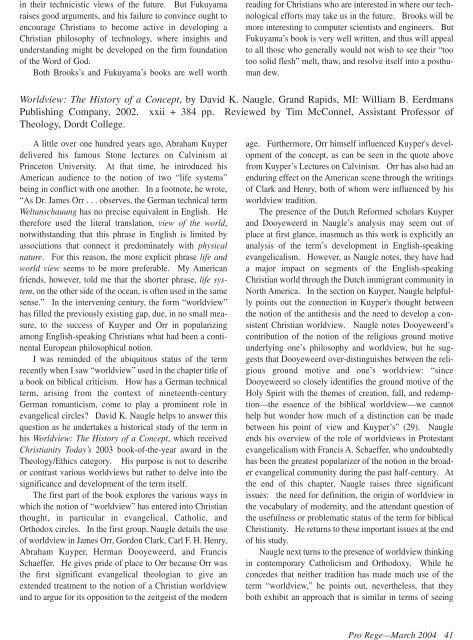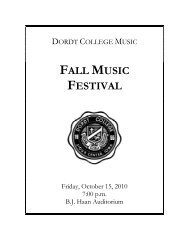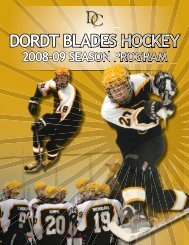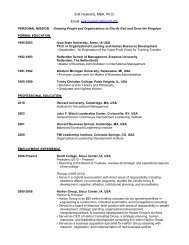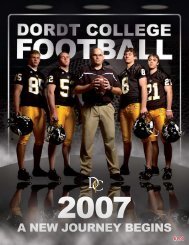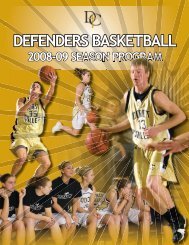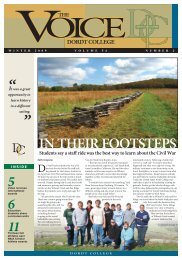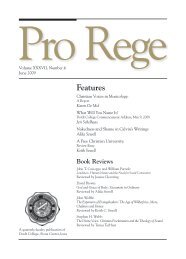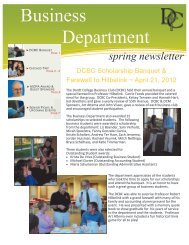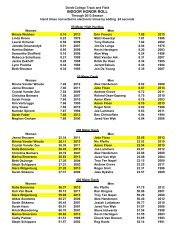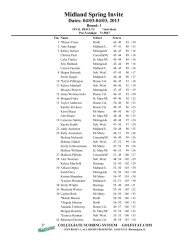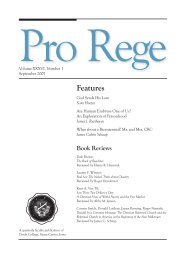Worldview: The History of a Concept, by David K ... - Dordt College
Worldview: The History of a Concept, by David K ... - Dordt College
Worldview: The History of a Concept, by David K ... - Dordt College
- No tags were found...
Create successful ePaper yourself
Turn your PDF publications into a flip-book with our unique Google optimized e-Paper software.
42 Pro Rege—September 1996the Christian faith as encompassing all <strong>of</strong> life. In particular,he points to John Paul II as a “worldviewish” pope andsees orthodoxy as being lived out as a “sacramental worldview.”He also notes that the creation-fall-redemptionschema is affirmed <strong>by</strong> all three traditions. Thus, in spite <strong>of</strong>significant differences, there is an underlying unity. Heconcludes, “Protestant evangelicalism, more than any otherChristian tradition, has deployed the idea <strong>of</strong> worldviewmost extensively. While it might be too much to say that itis a characteristic <strong>of</strong> evangelicalism, it is certainly a prominentfeature within it, especially in the Reformed context”(54).After setting the stage in this manner, Naugle comes tothe heart <strong>of</strong> his project: the exposition <strong>of</strong> the history <strong>of</strong> theworldview concept. He begins “A Philological <strong>History</strong> <strong>of</strong>‘<strong>Worldview</strong>’” <strong>by</strong> noting the universal acknowledgementthat Weltanschauung was first used in Immanuel Kant’sCritique <strong>of</strong> Judgment. <strong>The</strong>re it seems to refer to the senseperception <strong>of</strong> the world and has no great significance.However, the term was quickly picked up and developed <strong>by</strong>others, including Fichte, Schelling, Schleiermacher,Schlegel, Novalis, Hegel, and Goethe. In fact, its usebecame so pervasive throughout the nineteenth century that<strong>by</strong> the time <strong>of</strong> Orr and Kuyper, it was a commonplace inEuropean thought.Naugle continues with “A Philosophical <strong>History</strong> <strong>of</strong>‘<strong>Worldview</strong>,’” splitting it between the nineteenth and twentiethcenturies. He details the use <strong>of</strong> “worldview” in Hegel,Kierkegaard, Dilthey, and Nietzsche in the nineteenth centuryand in Husserl, Jaspers, Heidegger, Wittgenstein,<strong>David</strong>son, and the postmodernists Derrida, Berger andLuckmann, and Foucault in the twentieth century. As canbe seen from this list, the term has been used <strong>by</strong> a wide variety<strong>of</strong> thinkers over the past two centuries, and Naugle notesthe variety <strong>of</strong> ways (sometimes incompatible) in which theterm has been used and how it has been seen <strong>by</strong> some as apeculiarly modern construct.<strong>The</strong> fruitfulness <strong>of</strong> and the controversy over the concept<strong>of</strong> “worldview” have come about largely from its applicationto disciplines other than philosophy. Naugle focuseshis attention on “A Disciplinary <strong>History</strong> <strong>of</strong> <strong>Worldview</strong>”with chapters on the natural and social sciences. In the former,he looks at the writings <strong>of</strong> Polanyi and Kuhn. Kuhn'snotion <strong>of</strong> paradigm shifts in particular has had a furthercross-disciplinary impact. In the chapter on social science,Naugle looks at Freud and Jung in psychology; Mannheim,Berger and Luckmann [again!], and Marx and Engels insociology; and Kearney and Redfield in anthropology.After wading through this wealth <strong>of</strong> detail and analysis,one arrives at Naugle’s personal contribution to the discussionin his chapters <strong>of</strong> theological and philosophical reflectionson “worldview.” In these, he attempts to answer thequestions that he raised at the end <strong>of</strong> hisdiscussion <strong>of</strong> the Christian use <strong>of</strong> the term, namelydefinition and “usability.” He starts <strong>by</strong> adapting Kearney’sargument that the notion that one develops concerning“worldview” is dependent upon one’s worldview itself.Naugle accepts that there is no “neutral” concept <strong>of</strong> “worldview,”but he sees that claim as an opportunity to developan explicitly Christian Weltanschauung. In so doing, hestates that the denotation <strong>of</strong> the term is itself relativelyuncontroversial; what is at stake are the implications andconnotations <strong>of</strong> the term. <strong>The</strong>refore, he spells out fourimplications for worldview that result from his “theologicalreflections”: the objective existence <strong>of</strong> God, the subjectivity<strong>of</strong> the human being as God’s image and likeness, thecatastrophic effect <strong>of</strong> sin on the human heart and mind, andredemption <strong>by</strong> God through the person and work <strong>of</strong> JesusChrist in human history. <strong>The</strong> background <strong>of</strong> the biblicalmessage <strong>of</strong> creation, fall, and redemption can be clearlyseen in his delineation. His conclusion is that “Within thisbiblical framework the term Weltanschauung, or ‘worldview,’assumes appropriate Christian meanings, and anyharmful implications associated with the word historicallyare muted. Through this process <strong>of</strong> Christian naturalization,the concept as a valuable piece <strong>of</strong> ‘Egyptian gold’receives a new identity and is made useful for service in thechurch and acceptable to her Lord” (290).With the chapter on “Philosophical Reflections on‘<strong>Worldview</strong>,’” Naugle at last attempts to define the term.He writes, “I will propose that a worldview might best beunderstood as a semiotic phenomenon . . . . I will also proposethat a worldview as a semiotic structure consists primarily<strong>of</strong> a network <strong>of</strong> narrative signs that <strong>of</strong>fers an interpretation<strong>of</strong> reality and establishes an overarching frameworkfor life. . . . Finally, I will propose that a worldview asa semiotic system <strong>of</strong> world-interpreting stories also providesa foundation or governing platform upon or <strong>by</strong> whichpeople think, interpret, and know.” “Semiotic” has to dowith signs and symbols, and how they convey meaning.Thus, a worldview uses a particular set <strong>of</strong> narrative signs toestablish a symbolic universe, or a way <strong>of</strong> understandingreality. Naugle carries the reader through a discussion <strong>of</strong>worldview and narrative, worldview and rationality, worldviewand hermeneutics, and worldview and epistemology.He concludes, “A worldview, then, is a semiotic system <strong>of</strong>narrative signs that creates the definitive symbolic universewhich is responsible in the main for the shape <strong>of</strong> a variety<strong>of</strong> life-determining, human practices” (329-330).Naugle’s “Concluding Reflections” includes both thedangers and benefits <strong>of</strong> the concept <strong>of</strong> “worldview” forChristians, philosophically, theologically, and spiritually.Because <strong>of</strong> its focus on the metaphor <strong>of</strong> sight, its use posesthe possibility <strong>of</strong> an “alienating objectivism.” On the otherhand, “a philosophically sophisticated, God-centered conception<strong>of</strong> a Christian worldview spares believers from anaïve fideism, a scandalous anti-intellectualism, and a culturalobscurantism” (341). Perhaps the greatest danger is
Pro Rege—March 2004 43the spiritual one, <strong>of</strong> an overly enthusiastic pursuit <strong>of</strong> aChristian worldview: It is a grave mistake to confuse orsubstitute a proper relationship with the Trinitarian God forthe crafting and promulgation <strong>of</strong> a ChristianWeltanschauung. Now the two are fruitfully combinedsuch that one's relationship with God fosters the appropriateworldview, and vice versa. But it is still relatively easy toabsolutize the process <strong>of</strong> worldview formation as a means<strong>of</strong> Christian ministry and transform it into an intellectual orspiritual idol as an end in itself (338). While he clearly supportsthe concept as being beneficial overall, he neverthelessrecognizes potential dangers, both in its origin and in itsmisapplication.That “worldview” is an important and much-used conceptin contemporary evangelicalism hardly needs to bestated. Naugle has done the church and academy a greatservice <strong>by</strong> carefully studying the origins and history <strong>of</strong> theterm and <strong>by</strong> further reflecting on both the fruitfulness andpitfalls engendered <strong>by</strong> its use. As can be seen from the precedingsummary, the book can be broken easily into threemajor sections: an introductory part, which details theimpact <strong>of</strong> “worldview” thinking on Christian thought; themain part, which develops the history <strong>of</strong> the term in its variouscontexts; and a final section <strong>of</strong> reflections on “worldview,”with a view to defending its use <strong>by</strong> evangelicals andto further developing a proper understanding. As such,Naugle’s overall thesis is that Christians can make use <strong>of</strong>the term and concept <strong>of</strong> Weltanschauung without being necessarilyentangled in unwanted implications resulting fromthe origin and development <strong>of</strong> the term in the context <strong>of</strong>modernity. He remains cautious in his conclusions, but heclearly and persuasively answers his third question with hisargument that the term can be “baptized” and put toChristian use.One <strong>of</strong> the endearing features <strong>of</strong> the book is the inclusion<strong>of</strong> a prologue and epilogue, both based on the Narniatales <strong>by</strong> C. S. Lewis and used to illustrate what is meant <strong>by</strong>“worldview.” Many readers will also find the stories towhich Naugle refers to be elucidated <strong>by</strong> connecting them tothe notion <strong>of</strong> worldview. Moreover, Naugle gives anintriguing series <strong>of</strong> quotations prior to the Foreword, fromthe diverse group <strong>of</strong> William James, Richard Weaver,G. K. Chesterton, and Karl Barth. <strong>The</strong>se quotations,together with the Narnia prologue, aptly help to set up theensuing discussion.<strong>Worldview</strong>: <strong>The</strong> <strong>History</strong> <strong>of</strong> a <strong>Concept</strong> would be anexcellent resource for anyone seeking a better understanding<strong>of</strong> the term, particularly its historical development invarious fields. It would be appropriate for use in an upperlevelphilosophy course or for a seminary course dealingwith philosophy and apologetics. It is especially recommendedto those who make use <strong>of</strong> the concept <strong>of</strong> “worldview”in their teaching. You may not agree with all <strong>of</strong>Naugle’s analysis and conclusions, but he raises importantissues and helps us to think through what it means to developa genuinely Christian world-view.Donald R. Kelley, Fortunes <strong>of</strong> <strong>History</strong>: Historical Inquiry from Herder to Huizinga. Yale UniversityPress, 2003. xiii + 426 pp. ISBN: 0-300-09578-3. Reviewed <strong>by</strong> Keith C. Sewell, Pr<strong>of</strong>essor <strong>of</strong> <strong>History</strong>,<strong>Dordt</strong> <strong>College</strong>.Put simply, historiography is the writing <strong>of</strong> history.Accordingly, the history <strong>of</strong> historiography is the history <strong>of</strong>the writing <strong>of</strong> history. And the history <strong>of</strong> historiography is afascinating subject, addressing as it does the changing character<strong>of</strong> our historical awareness as well as the depth andextent <strong>of</strong> our historical understanding. Writing the history <strong>of</strong>historiography is a formidable task. Donald R. Kelley’sFortunes <strong>of</strong> <strong>History</strong>: Historical Inquiry from Herder toHuizinga is a continuation <strong>of</strong> his earlier Faces <strong>of</strong> <strong>History</strong>:Historical Inquiry from Herodotus to Herder (same publisher,1998). It is, perhaps inevitably, a book about books.Kelley’s work stands in the line <strong>of</strong> George Peabody Gooch’s<strong>History</strong> and Historians in the Nineteenth Century (1913,second edition, 1952), Herbert Butterfield’s Man on HisPast: <strong>The</strong> Study <strong>of</strong> the <strong>History</strong> <strong>of</strong> Historical Scholarship(1955), Eric Cochrane’s Historians and Historiography inthe Italian Renaissance (1981), and Norman Cantor’sInventing the Middle Ages: <strong>The</strong> Lives, Works, and Ideas <strong>of</strong>the Great Medievalists <strong>of</strong> the Twentieth Century (1991).This present volume is a remarkable achievement. <strong>The</strong>many references Kelley provides to authors and books arenot a defect but a fount <strong>of</strong> instruction. <strong>The</strong> easy flow <strong>of</strong> theprose rests on foundations <strong>of</strong> very considerable learning andscholarship. In commencing his discussion <strong>of</strong> the modernperiod <strong>of</strong> western historiography in the late eighteenth centurywith Herder (where else?), Kelley adopts an organizationalstrategy towards his subject matter that reflects a dominantfeature <strong>of</strong> the period itself—the rising power and dominance<strong>of</strong> nationalism. Accordingly, for a substantial part <strong>of</strong>this volume, Kelley focuses on the development <strong>of</strong> nationalhistoriographical traditions—the German (112-140, 173-197, 265-272), British (81-111, 225-253), French (141-172,198-224), and Italian (259-264). Understandably enough,American historiography emerges as an interweaving <strong>of</strong>indigenous and diverse European (and not least German)influences (280-303). All this is a mighty story, and theauthor handles the complexities with deftness and subtlety.He addresses for us the misconception that “historical-mindedness”arose preeminently out <strong>of</strong> a conservative reaction tothe French Revolution. <strong>The</strong> roots <strong>of</strong> this awareness lie in the


